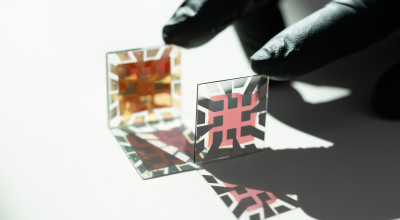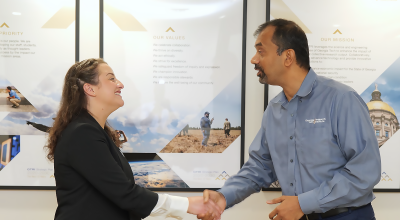
As a program deeply rooted in partnerships and in-person collaborations, STEM@GTRI — the K-12 educational project of the Georgia Tech Research Institute (GTRI) — suddenly found itself needing to pivot plans in the era of social distancing. However, what began out of necessity quickly turned into an opportunity as the program facilitators realized that going virtual could extend their impact past geographic boundaries.
STEM@GTRI exists as a K-12 outreach program, and since 1996, it has aimed to inspire, engage, and impact both educators and students in the fields of science, technology, engineering, and math (STEM). In 2019, STEM@GTRI hosted approximately 50 events, outreach programs, and partnerships with STEM organizations, reaching approximately 1,000 educators and over 30,000 K-12 students.
With a packed 2020 spring and summer schedule, members of the STEM@GTRI community were prepared for another fruitful season of learning and development; however, those plans came to a halt as a result of Covid-19.
Program facilitators Leigh McCook and Therese Boston realized they needed to quickly change plans to continue carrying out the program’s mission. While uncertainty existed around schooling and summer programming, GTRI desired to be a pillar of certainty for parents and teachers. By adjusting existing programming for virtual formats and creating new online resources, STEM@GTRI is bringing its expertise to students’ homes.
Learning from Home
Once the members of STEM@GTRI recognized their spring and summer programming would not be possible, they began collecting materials for remote learning. The growing catalog of resources — now available on STEM@GTRI’s website — serves a wide audience, including teachers, students, and even parents.
“I see these as resources for parents,” Boston, the senior research associate, explained. “Instead of kids’ taking breaks with video games, or watching TV, they could at least go to some of these resources — both the activities and links on the website.”
Whether parents are looking for a way to supplement their children’s preexisting schooling, or they just need a fun summer activity, STEM@GTRI’s STEAM Resources for Remote Learning has a collection of ideas.
While organizing the intended content for the resource page, the program administrators wanted to hold true to their core value of connecting individuals with STEM experts.
“We ultimately want to show what are the opportunities in STEM fields and what are some of the really cool things researchers, scientists, and engineers working in technology are able to do in the labs and in the industry,” McCook, GTRI division chief and director of STEM@GTRI said. “We want to bring those real-world applications to students and teachers, so students can connect what they are learning in the classroom to what the researchers are doing in the labs.”
While tours are on hold, visual elements help engage students. Therefore, not only will you find PDF lessons with activities on the resource page, but GTRI researches have also completed the activities in video format for you to watch and follow along.
Collaboration and partnership will always be at the core of STEM@GTRI. On the resource page, STEM@GTRI has pulled together a list of additional websites and organizations helping fill any gaps not covered by GTRI, including CEISMC’s “STEAM from a Distance” resource page. STEM@GTRI understands that through mutual support, they can better themselves and others.
Watch Annabel and Jack zap their hair with static electricity using a balloon, in this video from STEM@GTRI. Can you make your hair stand up, too? We hope you enjoy these STEM education resources as you learn from home.
STEM Experts Connect with Students
Pre-recorded videos are not the only way STEM@GTRI is working to connect STEM experts with students. STEM@GTRI is giving students an opportunity to connect with researchers through livestream.
McCook recalled how valuable these interactions have been before Covid-19 and social distancing.
“When you see the student come to a tour here, and you see them interact with a researcher and then ask questions, you can feel that excitement,” McCook said.
STEM@GTRI began asking, how can that encounter of coming on a physical tour be translated into a virtual experience?
In developing virtual STEM days, STEM@GTRI found a way for students to interface with researchers and scientists while staying in their homes. The program hopes that by connecting students and researchers once again, more light bulbs will turn on for students.
On May 8, 2020, GTRI co-hosted a Virtual STEM Day with The Flying Classroom, a fellow partner committed to providing supplemental STEM curriculum for K-8 students. Over several hours, 264 students, from eight counties in Georgia, attended the event. Captain Barrington Irving, founder of The Flying Classroom, served as the moderator.
Irving is an impressive figure, not only pioneering STEM education but also embodying innovation and service throughout his life. At age 23, Irving broke two world records, according to his bio. He was the youngest person to fly solo around the world, as well as the first black person to do so. He’s challenged high school students to build a plane, which he flew on one of his many expeditions. He’s been named the National Geographic’s Emerging Explore and received the National Business Aviation Association’s (NBAA) Spirit in Aviation Award.
Irving was joined by GTRI researchers and Karla Sue Marriott, professor of Chemistry and Forensic Science at Savannah State University, to present the virtual STEM day. From GTRI, Don Davis, deputy director of the Electronics, Optics, and Systems laboratory, presented “The Science of Flying,” and principal research scientist John Trostel and research scientist Jessica Losego explored “Severe Storms.”
Assisting Teachers in a Time of Need
Teachers hold a vast sphere of influence, interfacing with and impacting students on a daily basis. Thus, STEM@GTRI partners with educators to foster students’ interest in STEM. While in-person professional development events were placed on hold, Boston began exploring how virtual events could support educators.
The success of previous professional development events came from bringing teachers together and increasing the dialogue between them. Instead of merely providing resources for teachers to access online, STEM@GTRI brainstormed with Sean Mulvanity, an Assistant Principal in Liberty County and a former GTRI STEM@GTRI team member, and began exploring formats that could still facilitate peer-to-peer exchange.
GTRI researchers Ilan Stern, John Trostel, Jessica Losego, Leda Sox, and Jack Wood volunteered to join virtual professional development programs across various school districts.
“We are helping make connections between research, curriculum, and careers,” Boston said. “There are many cross points that allow us to make an impact.”
In these sessions, GTRI researchers discuss their areas of expertise while providing ideas on how educators can incorporate the "real world" applications into middle school science curriculum. Boston shared that these workshops are a source of her passion for STEM education.
“When we do these workshops for teachers, you see when it clicks and when they recognize, ‘This is something I could transfer over to my classrooms,’” she explained.
Several ideas have already begun to take root with the educators, and plans are being made for projects that can be undertaken this fall, whether students are in their classrooms or at home.
Taking Internships Online
Last year, 42 high school students teamed up with GTRI researchers to embark on a variety of research projects. Excited to continue growing the program, STEM@GTRI had a goal to engage 50 students in the 2020 program. Exceeding their expectations with 55 students, STEM@GTRI was then met with the quandary of having to alter their internship program.
“With the uncertainty of when we (GTRI employees) would all be coming back (to GTRI facilities), we couldn't plan for bringing the high schoolers on campus,” McCook said. “But we still very much wanted to hold the internship program because, as a mother of high school students, I see how much they've lost this year.”
After deliberation, the group elected to transition to an online internship. Not only does the online format allow GTRI to host the 55 excited high school juniors and seniors, but the facilitators believe online internship will provide a clearer picture of the experience teachers have been facing. That greater understanding will lead to more effective resources and advice for educators operating virtually.
McCook, along with Boston and Erick Maxwell, GTRI principal research engineer, has spent the spring figuring out the logistics of an online internship. The team did not want inequity of access to prevent any student from participating in the program they had already been accepted to; therefore, laptops have been secured and loaned to students over the summer.
The 2020 program will serve as a test to see if an online expansion of the internship program is possible for future cohorts.
Expanding Boundaries
While STEM@GTRI would not have chosen this path for their spring and summer, both McCook and Boston expressed the situation as having pushed them to explore new opportunities. Many of these online resources and programs were on the horizon for STEM@GTRI, but the timing had not yet worked out to begin testing and implementation. When Covid-19 required the program to pivot, they took the circumstances in stride.
Specifically, the program facilitators are thankful for the opportunity to expand past their geographic reach. Past programming primarily involved students in the metro Atlanta areas, who were able to travel on campus for tours and events. Online events and programming are now seen as a chance to build STEM@GTRI’s outreach, developing resources that could be distributed across the entire state of Georgia and, perhaps, beyond.
Through the online events, McCook emphasized, “It will let us provide rural students with resources to talk to a teacher or researcher about what it means to be an aerospace engineer or severe weather scientist. It lets them see what we do and maybe inspires them to pursue a career they had never thought about before.”
While the team eagerly awaits the opportunity to once again interact with students and educators in person, they also believe the online programming is here to stay. As the program continues to discover the most effective practices, the team plans to expand its online resources and extend its reach.
Photo credit: monkeybusinessimages, iStockphoto.com
Article credit: Katrina Heitz



